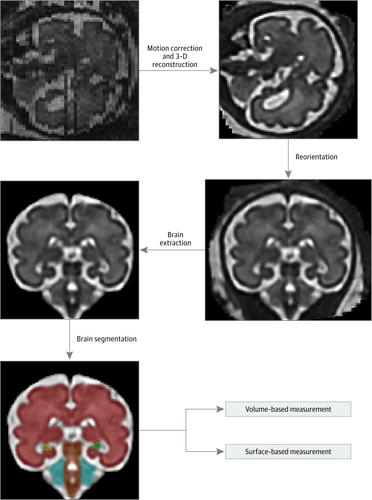当前位置:
X-MOL 学术
›
JAMA Pediatr.
›
论文详情
Our official English website, www.x-mol.net, welcomes your
feedback! (Note: you will need to create a separate account there.)
Association of Maternal Psychological Distress With In Utero Brain Development in Fetuses With Congenital Heart Disease
JAMA Pediatrics ( IF 24.7 ) Pub Date : 2020-03-02 , DOI: 10.1001/jamapediatrics.2019.5316 Yao Wu 1 , Kushal Kapse 1 , Marni Jacobs 2 , Nickie Niforatos-Andescavage 3 , Mary T Donofrio 4 , Anita Krishnan 4 , Gilbert Vezina 5 , David Wessel 6 , Adré du Plessis 7 , Catherine Limperopoulos 1, 5
JAMA Pediatrics ( IF 24.7 ) Pub Date : 2020-03-02 , DOI: 10.1001/jamapediatrics.2019.5316 Yao Wu 1 , Kushal Kapse 1 , Marni Jacobs 2 , Nickie Niforatos-Andescavage 3 , Mary T Donofrio 4 , Anita Krishnan 4 , Gilbert Vezina 5 , David Wessel 6 , Adré du Plessis 7 , Catherine Limperopoulos 1, 5
Affiliation

|
Importance
Prenatal maternal psychological distress can result in detrimental mother and child outcomes. Maternal stress increases with receipt of a prenatal diagnosis of fetal congenital heart disease (CHD); however, the association between maternal stress and the developing brain in fetuses with CHD is unknown. Objective
To determine the association of maternal psychological distress with brain development in fetuses with CHD. Design, Setting, and Participants
This longitudinal, prospective, case-control study consecutively recruited 48 pregnant women carrying fetuses with CHD and 92 healthy volunteers with low-risk pregnancies from the Children's National Health System between January 2016 and September 2018. Data were analyzed between January 2016 and June 2019. Exposures
Fetal CHD and maternal stress, anxiety, and depression. Main Outcomes and Measures
Maternal stress, anxiety, and depression were measured using the Perceived Stress Scale, Spielberger State-Trait Anxiety Inventory, and Edinburgh Postnatal Depression Scale, respectively. Volumes of fetal total brain, cerebrum, left and right hippocampus, cerebellum, and brainstem were determined from 3-dimensionally reconstructed T2-weighted magnetic resonance imaging (MRI) scans. Results
This study included 223 MRI scans from 140 fetuses (74 MRIs from 48 fetuses with CHD and 149 MRIs from 92 healthy fetuses) between 21 and 40 weeks' gestation. Among 48 women carrying fetuses with CHD, 31 (65%) tested positive for stress, 21 (44%) for anxiety, and 14 (29%) for depression. Among 92 pregnant women carrying healthy fetuses, 25 (27%) tested positive for stress, 24 (26%) for anxiety, and 8 (9%) for depression. Depression scores were higher among 17 women carrying fetuses with single-ventricle CHD vs 31 women carrying fetuses with 2-ventricle CHD (3.8; 95% CI, 0.3 to 7.3). Maternal stress and anxiety were associated with smaller left hippocampal (stress: -0.003 cm3; 95% CI, -0.005 to -0.001 cm3), right hippocampal (stress: -0.004; 95% CI, -0.007 to -0.002; trait anxiety: -0.003; 95% CI, -0.005 to -0.001), and cerebellar (stress: -0.06; 95% CI, -0.09 to -0.02) volumes only among women with fetal CHD. Impaired hippocampal regions were noted in the medial aspect of left hippocampal head and inferior aspect of right hippocampal head and body. Impaired cerebellar regions were noted in the anterior superior aspect of vermal and paravermal regions and the left cerebellar lobe. Conclusions and Relevance
These findings suggested that psychological distress among women carrying fetuses with CHD is prevalent and is associated with impaired fetal cerebellar and hippocampal development. These data underscore the importance of universal screening for maternal psychological distress, integrated prenatal mental health support, and targeted early cognitive-behavioral interventions given that stress is a potentially modifiable risk factor in this high-risk population.
中文翻译:

先天性心脏病胎儿母体心理困扰与子宫内脑发育的关系
重要性 产前孕产妇心理困扰会导致不利的母婴结局。随着胎儿先天性心脏病 (CHD) 的产前诊断,母亲的压力会增加;然而,母体压力与 CHD 胎儿大脑发育之间的关联尚不清楚。目的探讨母体心理困扰与冠心病胎儿脑发育的关系。设计、设置和参与者 这项纵向、前瞻性、病例对照研究在 2016 年 1 月至 2018 年 9 月期间从儿童国家卫生系统连续招募了 48 名怀有 CHD 胎儿的孕妇和 92 名低危妊娠健康志愿者。 2016 年 1 月和 2019 年 6 月。暴露胎儿先心病和母亲的压力、焦虑和抑郁。主要结果和措施 分别使用感知压力量表、斯皮尔伯格状态-特质焦虑量表和爱丁堡产后抑郁量表测量产妇压力、焦虑和抑郁。胎儿全脑、大脑、左右海马、小脑和脑干的体积由 3 维重建的 T2 加权磁共振成像 (MRI) 扫描确定。结果 本研究包括来自 140 名妊娠 21 至 40 周胎儿的 223 次 MRI 扫描(74 次 MRI 来自 48 名冠心病胎儿,149 次 MRI 来自 92 名健康胎儿)。在 48 名怀有 CHD 胎儿的女性中,31 名 (65%) 的压力测试呈阳性,21 名 (44%) 的焦虑测试呈阳性,14 名 (29%) 的抑郁测试呈阳性。在 92 名怀有健康胎儿的孕妇中,25 名 (27%) 压力测试呈阳性,24 名 (26%) 焦虑测试呈阳性,8 名 (9%) 抑郁测试呈阳性。17 名怀有单心室 CHD 胎儿的妇女与 31 名怀有 2 心室 CHD 胎儿的妇女相比,抑郁评分较高(3.8;95% CI,0.3 至 7.3)。母亲的压力和焦虑与较小的左侧海马(压力:-0.003 cm3;95% CI,-0.005 至 -0.001 cm3)、右侧海马(压力:-0.004;95% CI,-0.007 至 -0.002;特质焦虑: -0.003;95% CI,-0.005 至 -0.001)和小脑(压力:-0.06;95% CI,-0.09 至 -0.02)体积仅在患有胎儿 CHD 的女性中。在左侧海马头部的内侧和右侧海马头部和身体的下部观察到受损的海马区域。在 vermal 和 paravermal 区域的前上方和左小脑叶中注意到受损的小脑区域。结论和相关性 这些发现表明,怀有先天性心脏病胎儿的女性普遍存在心理困扰,并且与胎儿小脑和海马发育受损有关。这些数据强调了对孕产妇心理困扰进行普遍筛查、产前综合心理健康支持和有针对性的早期认知行为干预的重要性,因为压力是这一高危人群中一个潜在的可改变的风险因素。
更新日期:2020-03-02
中文翻译:

先天性心脏病胎儿母体心理困扰与子宫内脑发育的关系
重要性 产前孕产妇心理困扰会导致不利的母婴结局。随着胎儿先天性心脏病 (CHD) 的产前诊断,母亲的压力会增加;然而,母体压力与 CHD 胎儿大脑发育之间的关联尚不清楚。目的探讨母体心理困扰与冠心病胎儿脑发育的关系。设计、设置和参与者 这项纵向、前瞻性、病例对照研究在 2016 年 1 月至 2018 年 9 月期间从儿童国家卫生系统连续招募了 48 名怀有 CHD 胎儿的孕妇和 92 名低危妊娠健康志愿者。 2016 年 1 月和 2019 年 6 月。暴露胎儿先心病和母亲的压力、焦虑和抑郁。主要结果和措施 分别使用感知压力量表、斯皮尔伯格状态-特质焦虑量表和爱丁堡产后抑郁量表测量产妇压力、焦虑和抑郁。胎儿全脑、大脑、左右海马、小脑和脑干的体积由 3 维重建的 T2 加权磁共振成像 (MRI) 扫描确定。结果 本研究包括来自 140 名妊娠 21 至 40 周胎儿的 223 次 MRI 扫描(74 次 MRI 来自 48 名冠心病胎儿,149 次 MRI 来自 92 名健康胎儿)。在 48 名怀有 CHD 胎儿的女性中,31 名 (65%) 的压力测试呈阳性,21 名 (44%) 的焦虑测试呈阳性,14 名 (29%) 的抑郁测试呈阳性。在 92 名怀有健康胎儿的孕妇中,25 名 (27%) 压力测试呈阳性,24 名 (26%) 焦虑测试呈阳性,8 名 (9%) 抑郁测试呈阳性。17 名怀有单心室 CHD 胎儿的妇女与 31 名怀有 2 心室 CHD 胎儿的妇女相比,抑郁评分较高(3.8;95% CI,0.3 至 7.3)。母亲的压力和焦虑与较小的左侧海马(压力:-0.003 cm3;95% CI,-0.005 至 -0.001 cm3)、右侧海马(压力:-0.004;95% CI,-0.007 至 -0.002;特质焦虑: -0.003;95% CI,-0.005 至 -0.001)和小脑(压力:-0.06;95% CI,-0.09 至 -0.02)体积仅在患有胎儿 CHD 的女性中。在左侧海马头部的内侧和右侧海马头部和身体的下部观察到受损的海马区域。在 vermal 和 paravermal 区域的前上方和左小脑叶中注意到受损的小脑区域。结论和相关性 这些发现表明,怀有先天性心脏病胎儿的女性普遍存在心理困扰,并且与胎儿小脑和海马发育受损有关。这些数据强调了对孕产妇心理困扰进行普遍筛查、产前综合心理健康支持和有针对性的早期认知行为干预的重要性,因为压力是这一高危人群中一个潜在的可改变的风险因素。











































 京公网安备 11010802027423号
京公网安备 11010802027423号